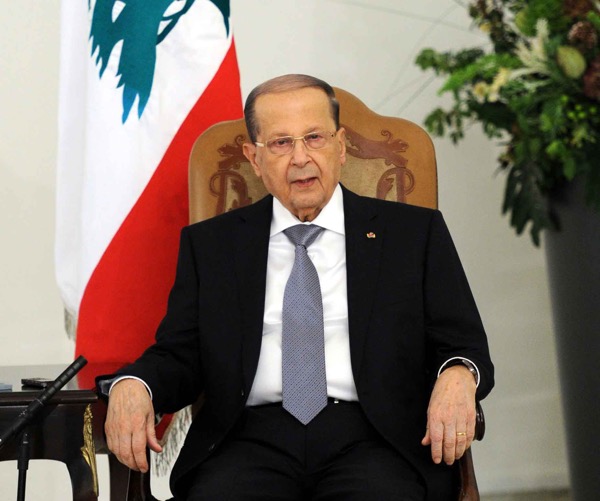
From yalibnan.com
A Progressive Socialist party delegation met with President Michel Aoun on Wednesday, where talks focused on the controversial electoral law, amid reports saying that the PSP leader MP Walid Jumblatt who favors the 1960 electoral law headed to Baabda today , to meet with president Michel Aoun Jumblatt was accompanied by a Progressive Socialist
Party delegation that included MPs: Wael Abou Faour, Ghazi al-Aridi,
Akram Shehayyeb, Alaa Terro and Henri Helou. Jumblatt reportedly planned to suggest some amendments to the 1960 electoral law which has been rejected by Aoun and his key ally Hezbollah who prefer the proportional representation law
Aridi, who spoke to reporters after the meeting, said that sectarianism and proportional representation law do not together Insisting on diversity and partnership, Aridi remarked:
“If the standards are to adopt proper representation (for the upcoming
parliamentary polls), we hope that the opinion of the Druze community is
taken into consideration.”
Earlier, reports have said that the PSP delegation
carries ideas of amendments that Jumblatt believes would develop the
1960 law, and help “save everyone’s face.” They added that the MP is expected to put forward a
suggestion to create a new governorate that includes the Chouf and Aley
areas, and to reconsider the distribution of MPs in Beirut, North Lebanon, West and North Bekaa to ensure proper representation at parliament. Lebanon is divided into eight governorates (mohafazah): Akkar, Baalbek-Hermel, Beirut, Bekaa, Mount Lebanon, Nabatieh, North Lebanon and South Lebanon.
In 2003, the number of Lebanese governorates increased
from six to eight. Two governorates were created, Baalbek-Hermel
(formerly part of the Bekaa) and Akkar Governorate (formerly part of
North Lebanon).
Mount Lebanon includes Aley, Baabda, Chouf, Jbeil (Byblos), Keserwan and Metn districts.
Aoun defended on Tuesday proportional
representation electoral system stressing that endorsing it guarantees
proper representation in the upcoming parliamentary elections
and stated that fears of it are not justified.
“Our utmost priority is to stage the parliamentary
elections based on a new electoral law that guarantees proper
representation for all Lebanese factions,” said Aoun in a speech during a meeting with the diplomatic corps at Baabda palace.
“Concerns of some political parties over endorsing a
proportional representation system are unjustified. Only a proportional
system is capable of ensuring proper and just representation for all
parties,” added the President.
He then added: “Some might lose their seats at
parliament shall this system be applied but in the end we will all win
the country’s stability.”
“My will as president of Lebanon is to dedicate this
position to embracing the unique Lebanese composition that is based on
diversity, which has proven over the years an ability to confront
challenges,” said Aoun.
“My will is to provide stability at the security,
political, economic, social and financial levels to enable Lebanon to
restore the positive role known to all on the international arena. We
have started setting the plans for that, and some of these plans are on
their way to implementation.”
The President also stressed that he is keen on protecting Lebanon’s sovereignty and preserving its national unity.
His comments come a day after the party that he founded
, the Free Patriotic Movement warned Monday of “ revolution” should
the political forces fail to agree on a new electoral law to replace
the so called 1960 law.
This development also comes after Speaker Nabih Berri
and Interior Minister Nouhad al-Mashnouq announced that the country is
likely headed to parliamentary elections under the 1960 electoral law
due to the parties’ failure to agree on a new law.
Aoun’s ally , the Iranian backed Hezbollah has
repeatedly called for an electoral law fully based on proportional
representation but other political parties, especially the Future
Movement, have rejected the proposal and argued that
the party’s controversial arsenal of arms would prevent serious
competition in regions where the Iran-backed party has clout.In 2013
Lebanese Forces and The Future Movement backed by the PSP agreed on a
hybrid electoral law which calls for 54% of the MPs to be elected under
the majoritarian winner-takes-all system and 46 % under the proportional
representation system. This draft law was rejected by the Hezbollah-led
March 8 opposition.
Also in 2013 Future Movement leader PM Saad Hariri rejected the
electoral law that is based on proportional representation because there
will be competition in some regions, but there cannot be any
competition in other regions, because of the presence of Hezbollah
weapons in them.
Hariri was referring to the 2009 election in
the areas dominated by Hezbollah. According to the reports that
surfaced back then Hezbollah gunmen prevented their rivals from voting
and the results of the election showed it. On the other hand in the
March 14 dominated areas several Hezbollah backed candidates won
the election that was based on winner take all . In a proportional
representation system Hezbollah will be able to gain more seats in the
March 14 dominated areas but will not lose any seats in its dominated
areas as long as it is allowed to keep its arms and use them internally
for political gain .
According to analysts Hezbollah wants to dominate Lebanon by insisting on adopting the proportional law in a single or several expanded electoral districts.
The country has not voted for a parliament since 2009, with the legislature instead twice extending its own mandate.
The 2009 polls were held under an amended version of the 1960 electoral law and the next elections are scheduled for May 2017.



